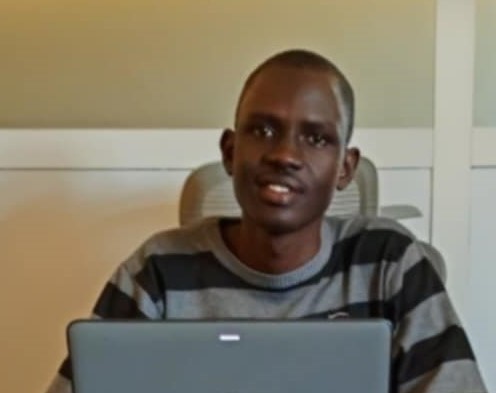“Maama!” Ssekandi exclaimed. “Denge, come and see.” Deng made his way towards the group. The group comprised three boys and two girls. There were similar groups all around, varying in composition and number. It was Saturday, and all Saturdays at Katonda Boarding Secondary School were known as ‘chilling days’. Students fished out their phones from the bottom of their suitcases and used them without fear of the teachers, prefects, or their dreaded DC. They used their phones to chat on Facebook and watch movies, but mostly, they just watched skits. Every rule was lax that day except for one: absolutely no porn.
Now, as Deng made his way towards the group, he found himself thinking, let it not be porn, please. He hated porn. It wasn’t even a question of being caught. He hated it because every time he watched porn, he was likely to run to the bathroom, and he hated what he did in there. Of course, not while he did it—then it was kind of nice—but after the act, he felt ashamed and dirty.
As he made his way to where the group was, another group nearby suddenly burst into thunderous laughter. Deng fought the urge to turn and find out what they were laughing about and finally tapped Ssekandi on the shoulder.
“Nakitende, rewind that thing,” Ssekandi said and waited as he looked on. “Not that one, Denge! The one where the man in the suit tries to date that beautiful girl… yes, that one.”
Deng sat next to Ssekandi and watched the skit that his friend so much wanted him to see. It was one of those with a laughing voice in the background, the kind that makes you laugh be-fore even seeing the content. Deng always thought of that method of skit-making as a double-edged sword technique. The audience always laughs along with the voice even if the skit turns out not to be funny at all. He laughed along with the voice as he watched.
A young man, probably in his early twenties, moved along the road, whistling. He was smartly dressed in a navy blue suit with a white shirt, complete with a white-striped dark blue necktie. Ahead of him was a girl, also probably in her twenties, dressed in a short tube dress. The kind that stops just above the knees and is so tight it accentuates her ass. The young man and the young woman passed each other along the road, the man absorbed in thought and the woman trying to hold her wig down so the wind wouldn’t blow it off her head. After passing the lady and realizing the fact, the young man turned to look at her, but his eyes only landed on her ass. Her ass is now zoomed in on, and as she moves, something like a ripple runs through it. The young man’s jaws drop.
“Nyash promax,” he whispers and runs after the young lady. Once he catches up with her, he says, “Sweet lady.” But the lady doesn’t respond, so he touches her on the shoulder. The lady turns sharply but doesn’t say anything. She looks at the young man intently, strikes her right index finger across her left palm, which is turned upwards.
“Sweet lady,” the man repeats, and the young woman repeats the index finger across the palm gesture and makes incomprehensible sounds in her throat. The man looks bewildered and flees.
Deng’s face had grown grave as he watched. It wasn’t funny, not in his world. He didn’t want to laugh, but all around him, Ssekandi and the other four laughed hard, even to the point of tears.
“She’s deaf, Denge. Deaf and stupid, and the man doesn’t want her,” Ssekandi said, tears of laughter rolling down his cheeks.
You stupid asshole. That’s sign language for ‘what?’ She wants to know what he wants and why he touched her, among other things. It’s not what you think, you stupid fucker with your yellow teeth. But Deng didn’t say any of that. He only smiled, mostly because doing so kept his world intact and Ssekandi close. He didn’t want to hurt Ssekandi, even though he knew right enough that the rate at which things were going, there would soon be a lot of laughter at Ssekandi’s end and a lot of tears at his own end once the guy found out his little secret. The secret he shared with the girl in the skit. His was mild, but his experience had taught him that people like Ssekandi always went hardest on the hard of hearing than they did on the com-pletely deaf. He should have known the first time he met Ssekandi that he was the kind who had no empathy, the kind who thought their way was the only way. The question he asked the first time they met was evidence enough.
“Denge Denge,” Ssekandi had read the name sewn on Deng’s new uniform through bursts of laughter. “Why do you Sudanese like repeating names?”
“That’s not repetition. That’s Deng, the son of Deng. My father is also called Deng, you know.”
“That’s bullshit. The Baganda should be allowed to civilize more tribes in Africa. Especially you Sudanese.”
“If it comes to that,” Deng retorted, “then the man called Jesus whom you worship had his names arranged in a similar manner to mine. Remember Matthew chapter one. The one that talks about Jesus’ genealogy—Jesus the son of Joseph, the son of Jacob, the son of Matthan, the son of Eleazar, the son of Eliud…”
But Ssekandi either did not remember or had never read the Bible beyond Genesis and had stubbornly denied the existence of such an arrangement of names in the Bible. Deng had let it drop, and for some reason, the two had become friends. That was about to end now, Deng thought.
“That was very funny,” he managed to say to the other five who were still laughing. Deng watched Nakitende calmly. She was laughing but gracefully, and while Deng hated them all for laughing, he found that he hated Nakitende less. He actually forgave her. He loved her, wanted her, but he hadn’t told her a thing as yet. Deng suspected she knew about his inten-tions already because, in his experience, women always know. She was just waiting for him to shoot his shot, as it were, and probably had her answer ready. If the answer happened to be a no, no problem. But if it turned out to be a yes… Deng shuddered.
She would want to have his phone number as sure as the Nile flows north. Then he would have to ask himself if he loved her enough to give her his real phone number. If the answer was no, he would give her his fake phone number—the one he had used with countless girls. But if the answer were yes, he would have to give her his real phone number and risk shouting endlessly, “Hello, hello, hello,” whenever she called him after night preps or during the holidays. Then it would be a matter of days before she asked the old familiar question, “Do you have a problem with your ears?” and the relationship would end suddenly, like a presidential decree. Not just that, Ssekandi and the whole school would find out his little secret.
* * *
Deng was afraid to shoot his shot, but as the ‘chilling day’ wore on, he decided he would shoot his shot anyway. One last time before I call it quits, he told himself. Tonight, he would rewrite the poem—the one he had used to woo so many girls. He was going to take Ankun-da’s name out and replace it with Nakitende’s. Other than that, he didn’t plan to change anything else.
—
 Lino Arop Kuol is a young South Sudanese with a dream of becoming an acclaimed author. He is also a YALI alumnus. Fuelled by an insatiable love for storytelling, he began writing stories in high school after reading and getting inspired by C.S Lewis’ ‘The Silver Chair’ and understanding that human imagination is a wonderful thing. Over the years, his short stories have appeared in magazines like CC&D and Writers Space Africa. He has also participated in writing contests and was first runner-up at the inaugural South Sudan Independence Young Writers Awards, 2020. Currently absorbed in his debut novel, ‘The Cycle of Hate,’ Lino finds that his childhood years in the war-torn Sudan provide an excellent understanding of the second Sudanese civil war, which is the subject of most of his stories.
Lino Arop Kuol is a young South Sudanese with a dream of becoming an acclaimed author. He is also a YALI alumnus. Fuelled by an insatiable love for storytelling, he began writing stories in high school after reading and getting inspired by C.S Lewis’ ‘The Silver Chair’ and understanding that human imagination is a wonderful thing. Over the years, his short stories have appeared in magazines like CC&D and Writers Space Africa. He has also participated in writing contests and was first runner-up at the inaugural South Sudan Independence Young Writers Awards, 2020. Currently absorbed in his debut novel, ‘The Cycle of Hate,’ Lino finds that his childhood years in the war-torn Sudan provide an excellent understanding of the second Sudanese civil war, which is the subject of most of his stories.
—
Read – One Last Time – A Short Story by Rekanor Mbeh – Nigeria







